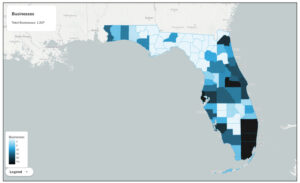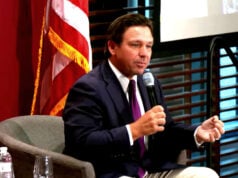
by Jay Waagmeester, Florida Phoenix
Researchers at the University of South Florida estimate there were 200,000 victims of sex trafficking in the state in 2024.
A research lab at the university developed what it called a “first-of-its-kind” report, commissioned by the state, looking at the prevalence of trafficking in the Sunshine State.
In addition, the report estimates there were 540,000 victims of labor exploitation or trafficking last year.
Of those sex trafficked, USF estimates, half were minors.
“We believe this annual report will make a substantial impact on anti-trafficking efforts, resulting in many adults and children being spared from the devastating consequences of human trafficking and many survivors receiving safe and effective assistance,” said Sen. Darryl Rouson, the appropriations sponsor of the lab, in a news release.
The report is a result of SB 7064, a 2023 law that made USF’s Trafficking In Persons lab the state repository for data compiled by state agencies such as the Department of Children and Families and Department of Juvenile Justice, plus nonprofit organizations. The law is set to expire in 2026, although lawmakers may vote to extend the program.
The 140+ page report details demographics of victims, the legal system as it relates to the crimes, community resources, and state agency support.
“A report like this had not been done in the past because it seemed impossible to gather all these strands of data located with so many different organizations,” said Joan Reid, director of the lab and a criminology professor at USF. “We are extremely grateful for both the state mandate to collect all this data and the funding to make it a reality and support the state’s ongoing response to combat trafficking.”
Of the incident reporting data from the Florida Department of Law Enforcement, 84% of victims in the last three years were female and 14% were male. Of the offenders, those numbers were flipped nearly identically, 83% male, 16% female.

The report also detailed the results of human trafficking screenings, a 2014 measure that looks to identify and locate youth who may be victims of commercial sexual exploitation. The Department of Juvenile Justice conducted 8,527 human trafficking screenings in 2024. Of those, nearly 8,000 were considered likely not or definitely not a victim. Many of those at least likely to be a victim were identified as running away excessively and potentially trafficked or sexually exploited.
The report says that Florida is “at the forefront in human trafficking policy, with penalties that far exceed the national average,” referencing that the maximum sentence for convictions of human trafficking crimes is life imprisonment.
FDLE reported 90 human trafficking arrests in 2024.
Data within the report show that 340,389 commercial sex ads were posted in the state during a 90-day window last year. The cities with the most sex ads per resident were Cocoa Beach, Pensacola, Destin, St. Augustine, Fort Walton Beach, Panama City, and Naples.
Jacksonville had the most total commercial sex ads with well more than double the next closest city, Orlando, followed by Tampa, Pensacola, Tallahassee, Daytona Beach, and Fort Myers.
Human trafficking, the report states, “operates on basic market principles: where this is demand, traffickers supply,” and that ads reflect demand.

The report compiled the number of illicit massage businesses in the state, facade businesses that are considered to lure victims into sex and labor trafficking. The cities with the most illicit massage businesses per resident were Naples, Orange Park, Port Richey, and North Palm Beach. The cities with the highest number of illicit massage businesses were Orlando, Miami, Fort Lauderdale, Jacksonville, Pompano Beach, and West Palm Beach.
Between 2019-2024, Broward County had the highest number of illicit massage businesses each year, according to the report, followed by Palm Beach and Miami-Dade counties.
The report said Florida is “especially susceptible to human trafficking” “[d]ue to its high population, the number of major cities that host national and international events, prevalence of airports and ports, and major industries such as agriculture, tourism and entertainment.”
Florida Phoenix is part of States Newsroom, a nonprofit news network supported by grants and a coalition of donors as a 501c(3) public charity. Florida Phoenix maintains editorial independence. Contact Editor Michael Moline for questions: info@floridaphoenix.com.
Disclaimer
The information contained in South Florida Reporter is for general information purposes only.
The South Florida Reporter assumes no responsibility for errors or omissions in the contents of the Service.
In no event shall the South Florida Reporter be liable for any special, direct, indirect, consequential, or incidental damages or any damages whatsoever, whether in an action of contract, negligence or other tort, arising out of or in connection with the use of the Service or the contents of the Service. The Company reserves the right to make additions, deletions, or modifications to the contents of the Service at any time without prior notice.
The Company does not warrant that the Service is free of viruses or other harmful components
This article originally appeared here and was republished with permission.












